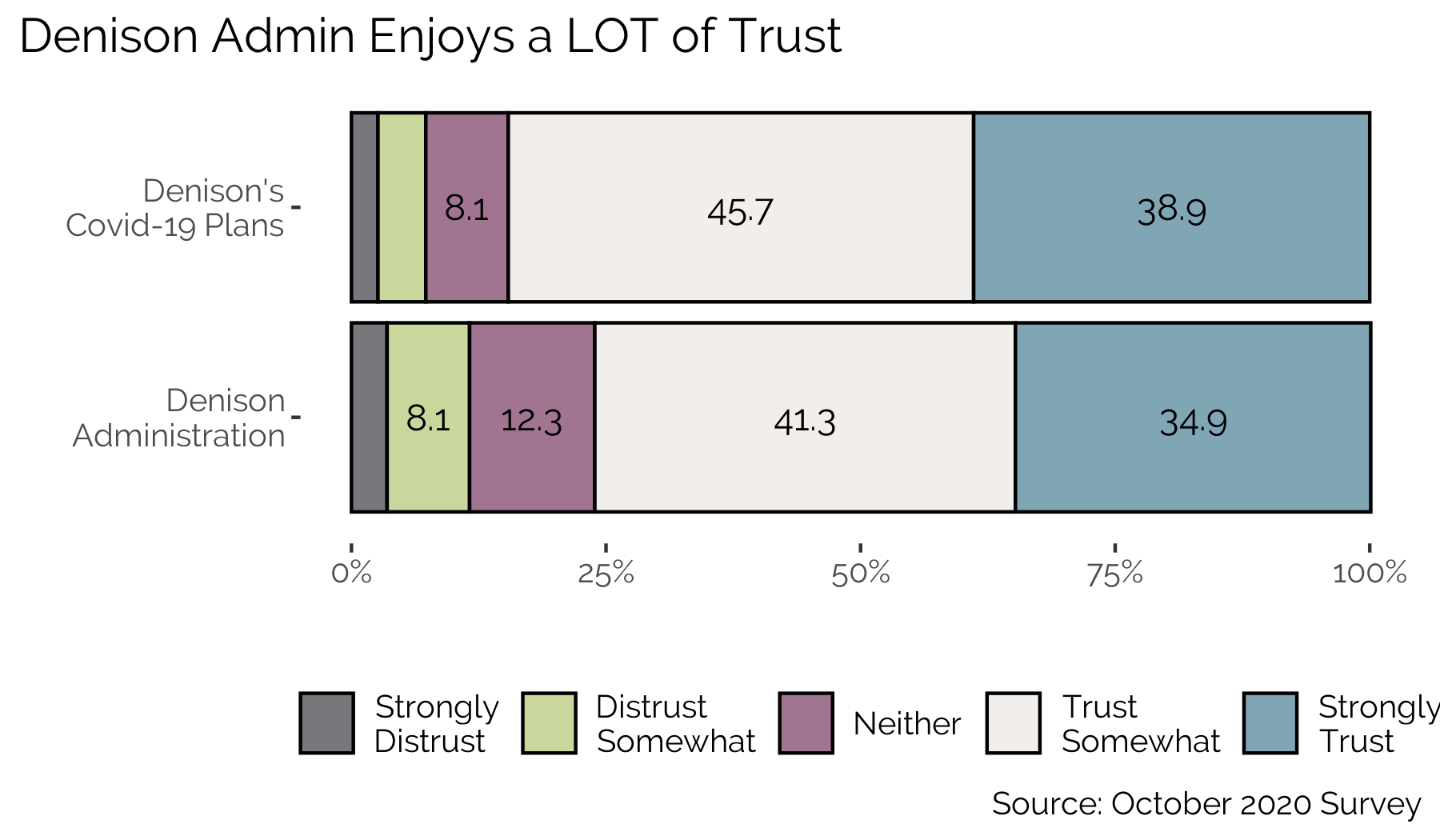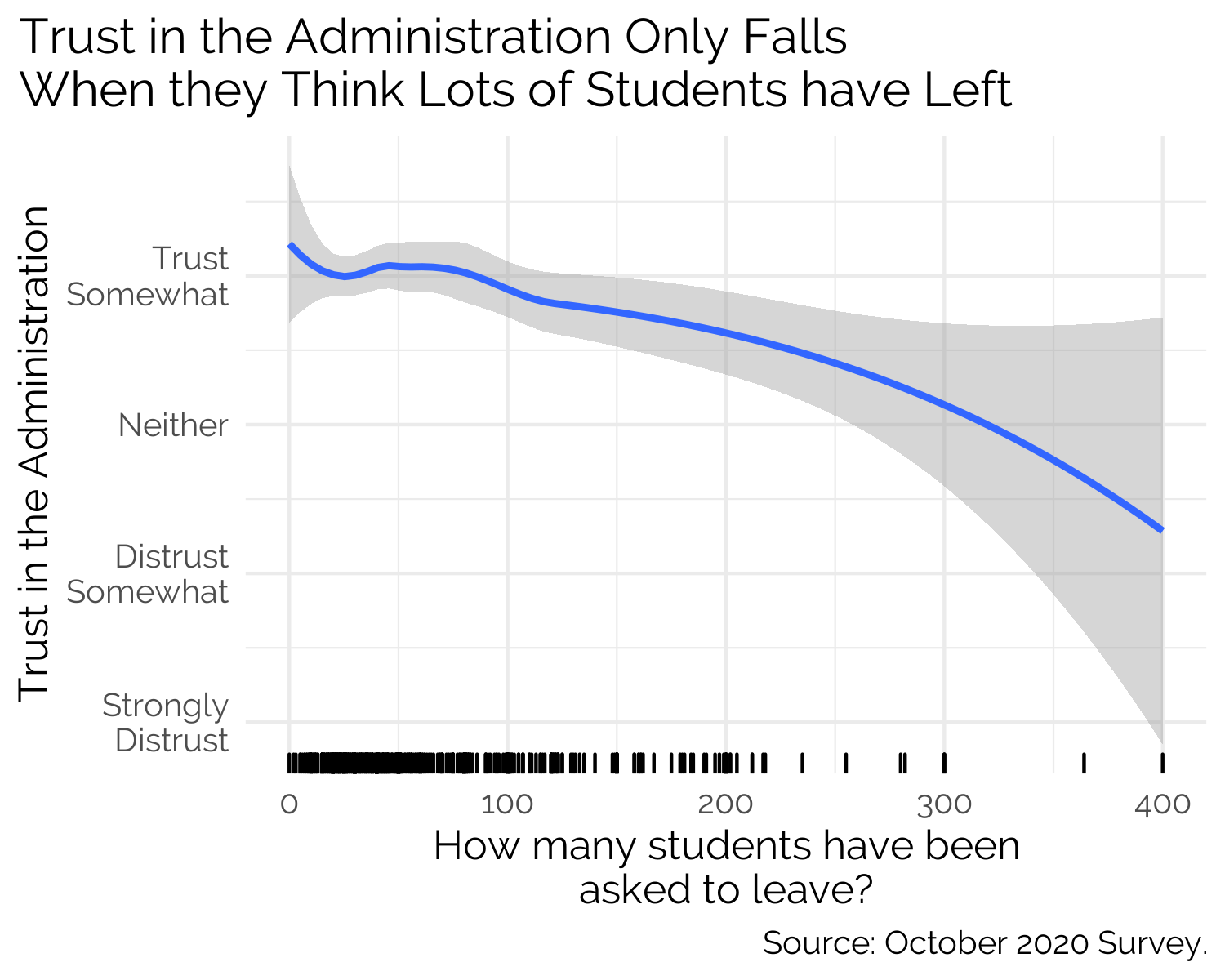By Siobhán Mitchell
As Denison enters what may be one of the most difficult times in its history, the fate of nearly 2,000 students hinges on the Weinberg administration. (POTUS gets their time in office identified by their surname, so it seems appropriate that Denison do the same for our president.) Although there is an obvious difference in reach between the two offices, 127 analyzed trends in favorability of both offices the past April, finding Dr. Weinberg’s favorability ranking has been very high over the years, but experienced the (inevitable?) “slide” in approval over time. However, by October 2020 that ranking has rebounded to its highest point in our data files: an 80. The only entity to score higher in our list was “Black Lives Matter” (at 84). Has that level of approval carried over to the Admin and its covid-19 plans?
As the pandemic and the Trump administration’s response (or failure to respond) complicates POTUS’s approval ratings, 127 questioned students on the trust (or lack thereof) they hold in the Denison administration to do the right thing, whatever that may be, while we experience the pandemic on campus. While the federal executive branch took a hands off approach to its pandemic response, the Weinberg administration inserted itself into student life more than ever before, creating the possibility to bring down his stellar ratings reflected through views of the administration.
Previous meddling with student life has been greeted with widespread opposition, shown through the spring 2018 announcement to install a new residential policy hiring full-time head residents to replace student staff. Students strongly disliked the intervention of ‘real adults’ in student life with 81% of respondents against the policy. This incident was prefaced by student opposition to security cameras in residence halls with a little less than half the respondents against the policy (16% were undecided).
Both events showed a clear distaste from students about Denison Admin playing Big Brother, setting a difficult scene for when administrative control may be essential to controlling public health. Feelings of autonomy go out the door with contact tracing, mandated flu shots/COVID-19 testing, and new residential policies (no parties, no sleepovers) even when it is in the best interest of the community.
Despite all the interference in student life, Denison enjoys a lot of trust from the student body. In arguably one of the most turbulent times in Denison (and American) history, over 7 out of 10 students trust the administration at least somewhat. In comparison to the small 20% of Americans who trust the federal government, Denison boasts a lot of trust from its community, and students have even more faith in Denison’s COVID-19 policies and procedures. When the survey was distributed in early October, Denison was impeccably healthy while the United States caseload kept climbing, showing a possible reason for confidence in the administration protecting our bubble.

Although the overall student body responded with overwhelming trust, personal experiences with Denison disciplinary procedures indicated a shift in attitude. Students who knew someone removed from campus correlated with a slight decrease in trust. When the issues become emotionally charged and personal, students may be less likely to look fondly upon those in control of their fate, though trust remains very high.

If you believe that the Community Care Agreement sucks, there is no reason to trust the administration, which is exactly what students indicated. Strong disagreement with the effectiveness of guidelines and responsibilities, which very few students think, correlated with the least amount of trust for the administration. While the link is clear, there are two paths of reasoning for the lack of faith in guidelines/responsibilities: students feel that the administration is not protecting them enough or the rules aren’t effective because COVID-19 isn’t a real threat. Either way, the few students who don’t think the guidelines work don’t trust the administration.

Additionally, trust takes a dive when students estimate higher numbers of their peers have been removed from campus. Again, the data is clear, the reasoning is not. Possibly, favorability dips in compassion for their fallen peers. Or, maybe students have little faith in their peers’ ability to party safely causing a spike in students kicked off. Whatever the reason, when students think that many people have been forced to leave, they indicate less faith in the administration. The “rug plot” at the bottom of the figure shows the concentration of estimates – very few students (5%) estimate that over 200 students have been asked to leave.

It’s difficult to argue with success and Denison has enjoyed bountiful amounts of it through the low COVID-19 numbers over the past 14 weeks. Weinberg ‘wrote the book’ on how to open a college campus safely, and perhaps that confidence is what drives student trust despite the administrative interference in life outside the classroom. Whatever the reasoning may be, justified or not, students express faith in the administration and its COVID-19 policies as we close up a safe and healthy semester.
Siobhán Mitchell is a senior Spanish major, on the premedical track, yet taking a political science independent study. By those standards, it shouldn’t come as a surprise that she can’t decide what to eat for dinner.